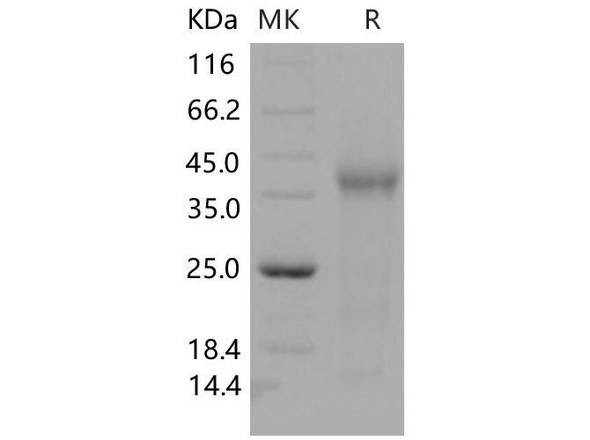| Sequence: | Gln 526-Thr 787 |
| Accession: | Q03167 |
| Storage: | Generally, lyophilized proteins are stable for up to 12 months when stored at -20 to -80°C. Reconstituted protein solution can be stored at 4-8°C for 2-7 days. Aliquots of reconstituted samples are stable at < -20°C for 3 months. |
| Shipping: | This product is provided as lyophilized powder which is shipped with ice packs. |
| Formulation: | Lyophilized from sterile PBS, pH 7.4. Normally 5 % - 8 % trehalose, mannitol and 0.01% Tween80 are added as protectants before lyophilization. Please refer to the specific buffer information in the printed manual. |
| Reconstitution: | Please refer to the printed manual for detailed information. |
| Background: | Betaglycan also known as transforming growth factor beta receptor III (TGFBR3), is a cell-surface chondroitin sulfate / heparan sulfate proteoglycan. TGFBR3 is a transforming growth factor (TGF)-beta type III receptor. This receptor is a membrane proteoglycan that often functions as a co-receptor with other TGF-beta receptor superfamily members. Ectodomain shedding produces soluble TGFBR3, which may inhibit TGFB signaling. Decreased expression of this receptor has been observed in various cancers. TGFBR3 is the TGF-β component most commonly downregulated among localized human prostate cancer studies. TGFBR3 knockdown led to focus formation and enhanced expression of CD133, a marker found on prostate cancer stem cells. TGFBR3 is an accessory receptor that binds to and modulates the activities of both transforming growth factor-beta (TGFβ) and inhibin, two members of the TGFβ superfamily of growth factors that regulate many aspects of reproductive biology. TGFBR3 is known to be expressed in adult testis and ovary, but little is known about this receptor during gonadogenesis. |






